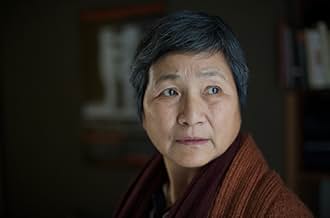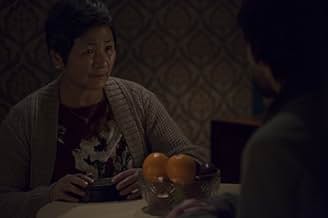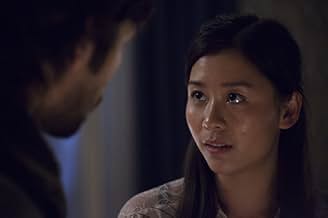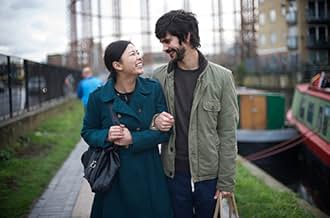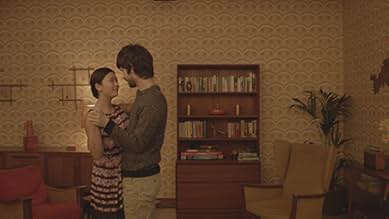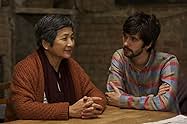Um jovem de ascendência sino-cambojana morre, deixando para trás sua mãe isolada e seu amante de 4 anos, que sofrem, mas não falam a língua um do outroUm jovem de ascendência sino-cambojana morre, deixando para trás sua mãe isolada e seu amante de 4 anos, que sofrem, mas não falam a língua um do outroUm jovem de ascendência sino-cambojana morre, deixando para trás sua mãe isolada e seu amante de 4 anos, que sofrem, mas não falam a língua um do outro
- Direção
- Roteirista
- Artistas
- Indicado para 1 prêmio BAFTA
- 4 vitórias e 7 indicações no total
- Junn
- (as Cheng Pei Pei)
- Vann
- (as Naomi Christie)
- Waiter
- (não creditado)
- Cafe customer
- (não creditado)
- Elderly Resident
- (não creditado)
- Café Customer
- (não creditado)
Avaliações em destaque
In many Wong Kar Wai films the actors speak to each other in different languages with seeming full understanding. It suggests a disjuncture between time, place and culture, where language, usually the unifying factor within the narrative, becomes the source of each character's isolation. Lilting is self-conscious in its language play and it works powerfully to both comic and emotional effect. This has the magic effect of bending time. Locations are practically sparse, but the film gives the feeling of having moved us quite literally around the world.
The film demonstrates that with translation, there is always something essential that is lost. This might be cultural sensitivity, the feeling that we understand when, actually, we do not. Thus, it questions the assumptions we all make. It might also be the feeling that we know something or someone when actually we do not.
This may sound a heady, difficult mix. Far from it.
The film is beautifully shot, and again we experience something of the camera work of Christopher Doyle (Wong Kar Wai's leading cinematographer) in the delicate and soft palate of colours, and subtlety of framing which are as evocative as the language play in evoking mood and location. Nothing is wasted in this film. Even landmark pieces of music (another Wong motif) sit perfectly within the cross cultural narrative.
This is a film I will watch again and not simply for the references to Wong Kar Wai, It's a seamless depiction of loss in a world of seeming falling borders.
I hope you enjoy the film as much as I have.
However Hong Khaou's film looks at the difficulties of communication at a much deeper level than the purely linguistic. He invites us to reflect on the wisdom of Kai's decision to put his mother in sheltered accommodation, whose dingy décor is designed to make elderly people 'feel better.' Despite Richard's basic kindness and his protestations of endless love for Kai, we wonder whether he actually understand what either Kai or Junn actually think. Maybe it's not really necessary to hire a translator: communication between individuals can take place at a subliminal level. Vann does her best to act as an intermediary between Junn and Richard, or Junn and Alan, but it's clear that her role is a peripheral one in the drama of familial relationships across cultures.
Shot in deliberately dark colors, LILTING depicts a world whose protagonists live in perpetual isolation, both literal as well as psychological. Junn's sheltered accommodation is both dark and prison-like; her fellow-residents seldom communicate except in clichés (Alan included). Richard's apartment is full of long, brick-lined passages; his kitchen is full of dirty cutlery, suggesting a fundamental inability to cope with life.
Our relationship with the two central protagonists is a complex one. Whishaw tries his best to render Richard a sympathetic character, but the more effort he makes to try and bridge the cultural differences separating himself from Junn, the more frustrated he becomes. His final outburst, where he accuses Junn of failing to "assimilate" to contemporary British cultures, is a classic colonialist statement, leaving us to reflect on why he himself did not do more to adapt himself to her mores. By contrast Junn remains both silent and serene; her final soliloquy reveals her determination to continue her existence, despite the prospect of future loneliness. She does not need to "assimilate"; she has found her own way to negotiate the culture she inhabits.
Modestly budgeted yet memorably staged by a director with an obvious affinity for the material, LILTING is an absorbing cinematic experience.
Perfectly clear throughout the whole running time is that Junn and Richard belong to two different worlds. There is much more than merely a language barrier that withholds them from really communicating. The interpreter he hired, Vann, dismisses Junn's lack of knowledge of the English language, calling her a "lazy bitch" which was obviously a common phenomenon under female immigrants. On one hand they could depend on their spouse or children to interface with the outer world, and on the other hand it demonstrates Junn's bland refusal to adapt to the world where she lived in for many years. That also explains how the English way to take care of the elderly, being very different from her own traditions, stood between Junn and Kai for a long time, in spite of Kai repeatedly saying that the home for the elderly she was put in, was just a "temporary" measure. Anyway, Kai did not have to cope with a language barrier, and still failed to drive the message home, particularly as he kept postponing a decision to explain the real relationship between himself and Richard, fearing she would not understand and working disruptively on the relationship between mother and son.
A nice find is the introduction of Alan as Junn's would-be lover. They "dated" several times before, both without understanding a word what the other was saying. This courting formed an excuse for Richard to hire Vann as an interpreter, fitting nicely his own hidden agenda to come closer to Junn. The relationship between Alan and Junn changes as soon as their communication improved. It brings several differences to light, some not so important but others seemingly insurmountable. Junn is not the modest passive woman we assumed at first sight; she can make her position very clear when felt necessary.
The final scene demonstrates hope for their future. Junn and Richard seem to be able to communicate without interpreter Vann translating each sentence (this is rather implicit, but even I understood by virtue of their body language). We see a mutual trust and understanding growing between the two when exchanging sentences, in spite of not really knowing what the other was saying. I must admit being a bit lost during this final scene. It took some time on the way home to grasp all the things that were shown implicitly. The preceding scenes were abundantly clear in comparison, but this one needed some afterthought. We can imagine for ourselves how their relationship is about to continue, this being left as an exercise for the viewer.
Você sabia?
- CuriosidadesFilmed in 3 weeks.
- Erros de gravaçãoAt the scene when Ben Whishaw and Andrew Leung were on bed, Ben says "You're really gonna do that?", but his lips don't move.
- Citações
Junn: Through plenty of crying, I've learnt to be content that I won't always be happy, secure in my loneliness, hopeful that I will be able to cope. Every year on Christmas Day I get very lonely. An incredible feeling of solitude. On this day, everything has stood still, even the trees have stopped rustling, but I'm still moving, I want to move, but I have nothing to move to, and nowhere to go. The scars beneath my skin suddenly surface and I get scared. Scared of being alone.
- ConexõesFeatured in Lilting: Deleted Scene (2014)
- Trilhas sonorasYe Lai Xiang
Performed by Xiang Lan Li
Principais escolhas
- How long is Lilting?Fornecido pela Alexa
Detalhes
- Data de lançamento
- País de origem
- Central de atendimento oficial
- Idiomas
- Também conhecido como
- Lilting
- Locações de filme
- Empresas de produção
- Consulte mais créditos da empresa na IMDbPro
Bilheteria
- Faturamento bruto nos EUA e Canadá
- US$ 27.054
- Fim de semana de estreia nos EUA e Canadá
- US$ 1.567
- 28 de set. de 2014
- Faturamento bruto mundial
- US$ 247.377
- Tempo de duração1 hora 23 minutos
- Cor
- Proporção
- 2.35 : 1
Contribua para esta página









